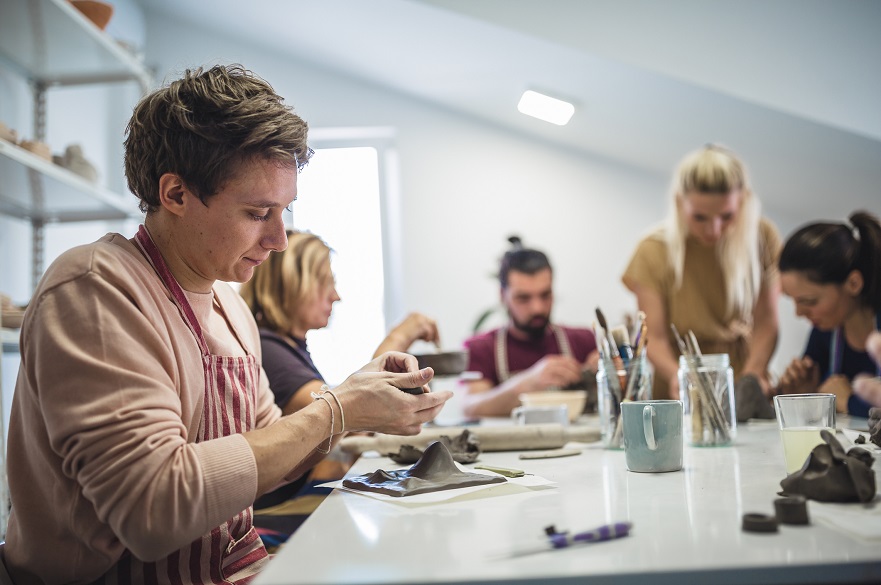NTU to support expansion of Nottinghamshire initiative to improve wellbeing and increase social connectedness
More Nottinghamshire residents will have access to an initiative which links them with activities to increase social connectedness and improve their wellbeing, as Nottingham Trent University (NTU) works to support the expansion of the Inspiring Ashfield programme into neighbouring communities.
By Helen Breese | Published on 22 March 2022
Categories: Press office; Research; School of Social Sciences;

Designed to tackle health inequalities in the area through a social prescribing approach, Inspiring Ashfield coordinates a partnership of more than 30 local arts, sports and community groups to produce a year-long calendar of events for local residents.
In partnership with Ashfield Voluntary Action, NTU will capture the successful elements of the initiative and transfer them to neighbouring districts, adapting the programme to suit the challenges and resources of each new area.
The project is one of twelve funded by the Arts and Humanities Research Council (AHRC) which are introducing innovative ways of using culture and nature to tackle health disparities.
The first stage of the project involves researchers understanding what makes Inspiring Ashfield work and what barriers there are to accessing it. To achieve this, they will be conducting interviews with people involved in the initiative, as well as talking to under-represented groups and those who have refused or disengaged from activities.
The findings will then be used to create a training programme for local stakeholders which will cover supporting place-based social prescribing; making sure it meets the needs of local residents; helping vulnerable individuals access activities; and ensuring proper funding and monitoring.
Professor Clifford Stevenson, lead researcher and Professor of Social Psychology at NTU’s School of Social Sciences, said: “There is an expanding gap between the most and least deprived areas across the UK which has led to increased health inequalities. Lack of money and resources at local community level contributes to poorer health among residents and increases their vulnerability to unforeseen challenges such as COVID-19. As a result, some communities have borne the brunt of the pandemic and now need support to enable them to cope with their situation.
“The NHS’s social prescribing approach connects socially vulnerable individuals to local community services or activities. This has been shown to reduce loneliness and improve health and wellbeing. However, the areas with the greatest need are often those with fewest resources and social prescribing is only as effective as the local activities available. In the wake of COVID-19, work is now required to revitalise local communities so that social prescribing can have its transformative effects.”
NTU will also support the roll out of the initiative by working with community organisations and local residents to explore which events would work best for them to maximize the impact that social prescribing has upon their lives.
Notes for Editors
Press enquiries please contact Helen Breese, Public Relations Manager, on telephone +44 (0)115 848 8751, or via email.
About Nottingham Trent University
Nottingham Trent University (NTU) received the Queens Anniversary Prize for Higher and Further Education in 2021 for cultural heritage science research. It is the second time that NTU has been bestowed the honour of receiving a Queen’s Anniversary Prize for its research, the first being in 2015 for leading-edge research on the safety and security of global citizens.
NTU was awarded Outstanding Support for Students 2020 (Times Higher Education Awards). It was the University of the Year 2019 (Guardian University Awards, UK Social Mobility Awards), Modern University of the Year 2018 (Times and Sunday Times Good University Guide) and University of the Year 2017 (Times Higher Education Awards).
NTU is one of the UK’s largest universities, with over 33,000 students and more than 4,000 staff located across five campuses. It has an international student population of 4,000 and an NTU community representing around 160 countries.
In the past 15 years, NTU has invested £450 million in tools, technology and facilities.
NTU is in the UK’s top 10 for number of applications and ranked first for accepted offers (2019 UCAS UG acceptance data) It is also among the UK’s top five recruiters of students from disadvantaged backgrounds.
75% of NTU students go on to graduate-level employment or graduate-entry education / training within fifteen months of graduating (Guardian University Guide 2021).
NTU is 4th globally (and 3rd in the UK) for sustainability in the 2021 UI Green Metric University World Rankings (out of more than 900 participating universities).
About the Arts and Humanities Research Council
The Arts and Humanities Research Council (AHRC), part of UK Research and Innovation, funds internationally outstanding independent researchers across the whole range of the arts and humanities: history, archaeology, digital content, philosophy, languages and literature, design, heritage, area studies, the creative and performing arts, and much more. The quality and range of research supported by AHRC works for the good of UK society and culture and contributes both to UK economic success and to the culture and welfare of societies across the globe.